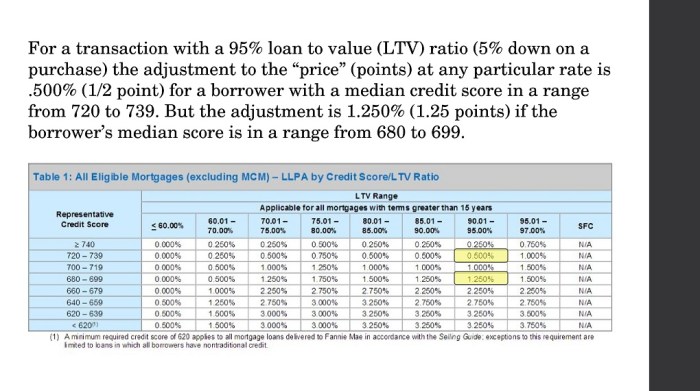Impact of credit scores on loans sets the stage for this enthralling narrative, offering readers a glimpse into a story that is rich in detail and brimming with originality from the outset. Dive into the world of financial influence and discover the secrets behind loan approvals and interest rates.
Importance of Credit Scores

When it comes to applying for loans, credit scores play a crucial role in determining approval and interest rates. Lenders use credit scores to assess an individual’s creditworthiness and ability to repay the loan.
Impact on Loan Approvals
- Credit scores significantly influence whether a loan application gets approved or denied. A higher credit score indicates a lower risk for the lender, making it more likely for the loan to be approved.
- On the other hand, a lower credit score may result in a loan denial or require a co-signer to secure the loan.
Influence on Interest Rates
- Higher credit scores often lead to lower interest rates on loans, as individuals with good credit are considered less risky borrowers.
- Conversely, lower credit scores can result in higher interest rates, as lenders may view these borrowers as higher risk and charge more to offset the perceived risk.
Factors Affecting Credit Scores
When it comes to credit scores, there are several key factors that can have a significant impact on an individual’s overall score. These factors play a crucial role in determining a person’s creditworthiness and ability to secure loans and favorable interest rates.
Payment History
Your payment history is one of the most important factors that influence your credit score. It reflects how well you manage your debts and bills over time. Making timely payments on your credit cards, loans, and other financial obligations can help boost your credit score. On the other hand, missing payments or paying late can negatively impact your score. Lenders want to see a consistent history of on-time payments to assess your reliability as a borrower.
Credit Utilization Ratio
Another key factor that affects your credit score is your credit utilization ratio. This ratio is the amount of credit you are currently using compared to the total amount of credit available to you. Ideally, you should aim to keep this ratio below 30% to maintain a good credit score. High credit card balances and maxed-out credit limits can signal to lenders that you may be overextended financially, which can lower your credit score. Keeping your credit utilization low shows responsible credit management and can positively impact your credit score.
Types of Loans Affected by Credit Scores
When it comes to loans, credit scores play a vital role in determining the interest rates, approval, and terms of the loan. Different types of loans are impacted by credit scores in various ways.
Mortgage Loans vs. Personal Loans
Mortgage loans and personal loans are two common types of loans where credit scores have a significant impact. For mortgage loans, a good credit score is crucial as it can determine whether you qualify for a loan, the interest rate you will receive, and the amount you can borrow. Lenders typically offer lower interest rates to borrowers with higher credit scores, saving them money over the life of the loan. On the other hand, personal loans may be more flexible in terms of credit score requirements, but a higher credit score can still lead to better terms and lower interest rates.
Auto Loans and Student Loans
Credit scores also play a key role in auto loans and student loans. For auto loans, a higher credit score can lead to lower interest rates, making the loan more affordable. Lenders may also be more willing to finance a vehicle for someone with a good credit score. Similarly, student loans are influenced by credit scores, especially for private student loans. A higher credit score can help you secure a lower interest rate and better repayment terms. It can also impact your ability to qualify for certain student loan programs.
Strategies to Improve Credit Scores for Loan Approval
Improving your credit score is crucial before applying for a loan as it can greatly impact the terms you are offered. Having a good credit score can help you secure lower interest rates and better loan options.
1. Check Your Credit Report Regularly
- Review your credit report for any errors or discrepancies.
- Dispute any inaccuracies to the credit bureaus to have them corrected.
2. Pay Bills on Time
- Set up automatic payments or reminders to ensure timely payments.
- Payment history is a significant factor in determining your credit score.
3. Reduce Credit Card Balances
- Try to keep your credit card balances below 30% of your credit limit.
- Lowering your credit utilization ratio can positively impact your credit score.
4. Avoid Opening Multiple New Accounts
- Each new account can generate a hard inquiry which can temporarily lower your credit score.
- Focus on managing your existing accounts responsibly instead.
5. Keep Old Accounts Open
- Longer credit history can be beneficial for your credit score.
- Even if you don’t use them, keeping old accounts open can help improve your credit score.
